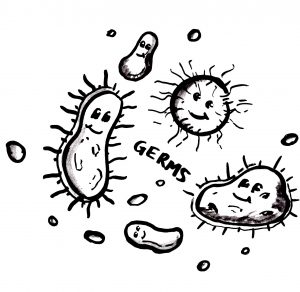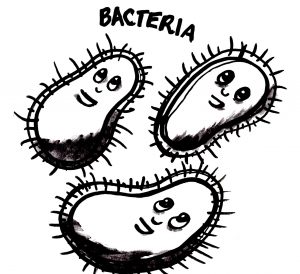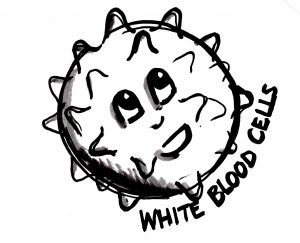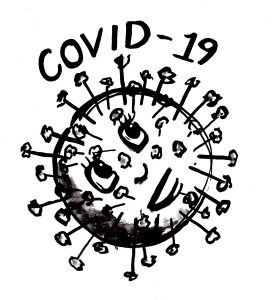
Author: Layal Bou Abdo, MSN
Illustrator: Angeline Boswell
03/17/2020

Germs are teeny tiny particles that are everywhere and when they enter your body, they can make you sick. They are parts of an army that you can’t see with open eyes. The scientific name for germs is “pathogen”. An illness caused by pathogens is called an infectious disease and is only seen with a microscope.
“I know that germs will make me sick, but I am so tired of washing my hands every time I come in!” – my 5 years old said furiously.
What are the pathogens?
Pathogens are very, very small organisms (called microorganisms) that invade the body and make it sick. Examples of pathogens are viruses, bacteria, parasites, and fungi. Pathogens are also called microbes or microorganisms that attack our bodies and make us sick.
How can germs make us sick?
Germs are everywhere: they can float through the air, survive in water, on doors knobs, on tables, on toilets, and even your skin. They fly in the air when you sneeze or cough and wait to infect other humans. The germs will land on their food, hands, or will be breathed in like air, this is how they make you sick.
Let’s meet the Virus
We are small particles visible only with a microscope. We could not live if we did not enter a plant or the body of a human or animal we call the “host”. A protein coat or CAPSID make up my protective shell. Inside I am made of Nucleic Acid, a core of genetic material, either RNA or DNA. When I enter a host, and at a cellular level, I throw my shell away and inject my nucleic acid inside the cell-manufacturing factory. I do magic and force the body cell to make copies of me. The body releases those copies to attack different cells. This is how I make your body sick.
Example of viruses are: common cold, influenza, chickenpox, measles, mumps, yellow fever, hepatitis and Coronavirus
I can pass from one person to another by shaking hands, touching food, through water, or through the air when a person coughs or sneezes.
I can also pass on by insect bites, animals, or through bad food.
Let’s meet the Bacteria
We are microbes (small particles) and we are only visible with a microscope. Don’t call me pathogen because most of us are not dangerous and are actually helpful. I play an important role in the planet’s ecosystem as well as in human survival. I am everywhere; in the air, on your skin, in your bodies, in the ground, and all throughout nature. In the soil, I help break down material from dead plants and animals and, I also help to fertilize the soil with nitrogen for plants to use when growing.
I am available in food, like yogurt, cheese, pickles, and soy sauce. I live inside your body and help in the digestion. Some of us can also help your immune system.
Yes! A few of us are bad and can cause diseases such as tuberculosis, cholera, typhoid fever, and tetanus. When we enter a host, we frustrate the immune system and damage the body cells. Our goal in life is to double and to keep doubling and doubling. This way we keep increasing and this is how we make you sick!

Meet the Parasites
We are organisms, or living things, that live on or insides another organism. We can spread from one host to another through the air, through contaminated water or food, or through feces. Some of us rely on a third organism to spread us to our host, for example through the bites of certain mosquitoes. Others pass through more than one host, for example, the roundworms that cause the disease called trichinosis. Pigs are their first host, and the humans that eat the meat of the pigs are their second host.
Some parasitic diseases include malaria, sleeping sickness, and scabies.
Meet the fungi
We are living organisms that like to live in groups that are classified in their own kingdom. We are microorganisms such as yeasts and moulds. I am available throughout the Earth including on land, in the water, in the air, and even in plants and animals. We have different sizes from microscopically small to the largest organisms on Earth. We grow by eating from our host. Many of us are food such as mushrooms and truffles. Yeast is a type of fungi used in baking. Scientists use us to kill bacteria that can cause infections and diseases in humans. We make antibiotics like penicillin and cephalosporin. Some of us are bad and can cause diseases such as fungal meningitis, ringworm, and thrush.
Our immune system
We germs cannot make you sick every time we enter your body. In the land of lymph reside the White Blood Cells (WBCs), which are like police guards protecting the body against germs. There are many types of WBCs, but they are all parts of the immune system and they all protect the body against all sorts of foreign invaders. When a germ infects the body, they activate the WBCs. The WBCs tell other cells to fight back. The WBC’s team up to go fight the germs. When all the WBCs go fight together, they will have the chance to defeat the germs.

Types of WBCs
The Macrophage is a blind type of WBCs, and they eat anything in their path and spit off pieces. Those leftovers are called antigens. They kick helper T cells into gear. Helper T’s are like captains of the immune system, they activate the killer T and B cells.
The killer T cells are the attackers, and they destroy cells that are already infected by the germs. The B cells create antibodies that bind to the germs like a puzzle and stop the germ from spreading and from attacking new cells. They will, therefore, attract more WBCs to the battle.
Treatment of infections
Germs can make you sick but in the majority of the times, there is a cure. The treatment of infection varies depending on your pathogen. Recommended treatments are to:
- Drink plenty of fluids
- Take medication for the fever, if any, as the doctor might prescribe an antibiotic for a bacterial infection, an antiviral for a viral infection and antifungal for a fungal infection.
- Have a vaccination, as it can produce a lot of antibodies; there are vaccines for viruses and some bacteria.
 COVID-19
COVID-19
I am a virus and a cousin of the cold and flu. My other name is a coronavirus. I am so contagious and like to travel. I am famous recently because I am all over every continent. I rarely attack young children. I cause fever and cough and sometimes shortness of breath and pneumonia. I don’t stay for a long time and, the majority of people will get better.
I can be prevented by:
- Washing your hand for at least 20 seconds or,
- Using hand sanitizer when your hands are not visibly dirty and applying it using the same technique as hand washing while letting it dry on your hand
- Dabbing when you cough or sneeze
- Asking people to keep their hands to themselves
- Keeping distance from others for at least 6 feet or 2 meters.
- Exercising regularly and eating lots of healthy food like fruits and vegetables
- Wear a mask when you cannot practice physical distancing
When you should wash your hands?
- Before or after you
- Prepare or eat food
- Touch a cut or open sore
- Touching eyes, nose or mouth
- After you
- Sneeze, cough or blow your nose
- Use the washroom
- Handle Garbage
- Play outdoors
- Before or after you
Because the virus is now everywhere, people are asked to “self-isolate”. This means that you will not have play dates, go to school, or go out unless it’s necessary. This is how adults are trying to keep you safe and healthy. This will not last for a long time and you will be back soon to your normal life.
There is no vaccine available for the coronavirus at this stage, however, experts are working around the clock to develop it.
Fun Fact
Did you know that viruses and bacterias get killed at high temperatures? This means that your body protects you from pathogens when you develop a fever.
We are certain your kid asks you health (human & animal) questions that genuinely leave you stumped! Leave a comment below and we are happy to answer “why” in future blogs.
Copyright © 2020 Little Medical School Ottawa

Thanks Little Medical school blog for giving the opportunity to ask questions regarding my childs health
I have a girl child 5 yrs old with dry spotty patches at skin where she sweats like fold of arm and legs what it could be fungal or normal dryness. Now she has picky eating habits not to much veggies the problem persist due to lack of vitamins because she is not allergic to any substances.
Hi Naveen,
We are afraid not be able to answer your question! Please refer to your physician regarding your daughter’s case!
We are an institution that provides education to kids, related to health and science and this blog is made for those kids who ask lots of why questions because they are curious and eager to learn.
[…] forget to wash your hands and face after the nosebleed […]
[…] even if someone touches the eyes, nose, or mouth after handling something with cold / influenza/ COVID-19 viruses on […]
[…] you know that DNA and RNA are also found bacterias and […]
[…] with a towel, soap, and a little water and use a dry shampoo to clean their hair. To prevent the spread of germs, astronauts should keep themselves clean and their environment […]
[…] have covered in a previous blog, why do we pass gases and all about bacteria that live inside […]
[…] are at least ten times as many bacteria in the human body as […]